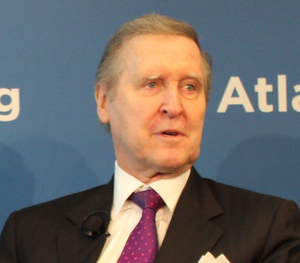
On Wednesday, May 9th, the Adrienne Arsht Latin America Center and the Scowcroft Center for Strategy and Security, in partnership with HSBC, hosted an event titled “Spiraling US-China Trade Tensions and the Implications for Latin America and the World.” The event featured a keynote conversation with former US Secretary of Defense William Cohen, moderated by Gerardo Mato, chairman of global banking and markets, Americas, for HSBC. The event was opened by Atlantic Council President and CEO Fred Kempe, and featured a panel with former US Ambassador to Mexico Carlos Pascual, senior vice president of the US-China Business Council, executive director for Brazil and Suriname at the Inter-American Development Bank, Senior Private Sector Specialist, Macroeconomics, Trade & Investment Barbara Kotschwar at the World Bank, and president of Lennar International Chris Marlin. The panel was moderated by Jason Marczak, director of the Adrienne Arsht Latin America Center. This event also celebrated the 5th anniversary of the Adrienne Arsht Latin America Center.
Webcast:
Gerardo Mato’s introductory remarks touched on the trade tensions between China and the United States, by noting that the increased economic uncertainty will likely cause price volatility in commodity prices, of which Latin America is a big exporter. Mato discussed how trade conflict between great powers could harm economic momentum, not only for Latin America, but for the entire world. He concluded by stating that he does think that both China and the US are back on the right track by returning to the negotiating table, but there is still a long way to go to restore the global economic outlook.
Mato then introduced Secretary William Cohen, former US secretary of defense and chairman and CEO of the Cohen Group. Cohen spoke about the current administration’s approach to China and the growing tensions between the two powers. The secretary noted how it’s important that the administration challenge the Chinese policies that they consider harmful, but warned that it should be done in a thoughtful and strategic manner, so as to avoid an economic Thucydides trap.
Secretary Cohen also stated that he regretted that the US pulled out of the Trans-Pacific Partnership (TPP), because he saw the trade deal as leverage to impel China to move toward US influenced trade rules. He also expressed concern that most people see the current tensions as temporary, although he doesn’t. China has changed the gravitational pull of the universe, he said, and the notion that things will go back to the way they were just isn’t the case. Cohen concluded by stating that the US has traditionally looked East to West, and that despite a short period of time where it looked North to South, the country’s government has tended to ignore Latin America, making way for newfound Chinese influence in the region.
Following Mato and Cohen’s conversation, Jason Marczak, went onstage and introduced the event’s panel. Ennis spoke on the details of the US-China trade tensions. She began by highlighting while there was very little accomplished in the recent US delegation to Beijing, the fact that they met in the same room in the first place was a success in itself. Ennis also stated that there was still a way to deescalate the current situation, given that no side has implemented tariffs yet. On TPP, she said that her disappointment at the administration pulling out of the deal was mostly because the deal was already working, and conversations with Chinese officials about China eventually joining the TPP had been happening as a result of TPP negotiations.
Ambassador Pascual gave the audience a geopolitical perspective on the issue. He said both countries are still trying to understand how big this problem can get, and nobody knows yet whether it will grow to be a global trade war or if it will be contained between the US and China. If it does grow to become a global trade war, most countries will be severely affected because of it.
Kotschwar elaborated on the potential impacts for the China-Latin America trade relationship. She expressed her concern that the trade tensions cannot be easily contained, given the scale of the two parties involved and how important they both are for global value chains. She also sees potential opportunities for Latin America to expand its markets, as Brazil could find itself exporting more soybeans to China, and Chile and Argentina could export more wine. However, she believes that the negative impacts of these tensions will overwhelm the possible opportunities.
Marlin provided a business perspective. He explained how the recent trade rhetoric alone had been enough to have an effect on businesses, and how the brand of “America” is no longer seen by the Chinese the way it once was. Additionally, Chinese firms see the change in policy by the US government and pivoted accordingly from investing in the US to focusing on Belt and Road projects. Marlin added that the trade conflict had, in a similar fashion, accelerated Chinese investors’ turn towards Latin America.
Reis gave the audience insights into how Latin American countries are looking at the growing trade conflict. He recognized that a trade war or trade conflict escalation could have serious potential impacts for countries like Brazil, but he was unsure whether these could be positive or negative. He stated that Latin American countries need to explore diversification in order to mitigate risks in this new volatile trade environment, and that they must invest in technology and innovation in order to rise up the value chain and export higher value-added goods.